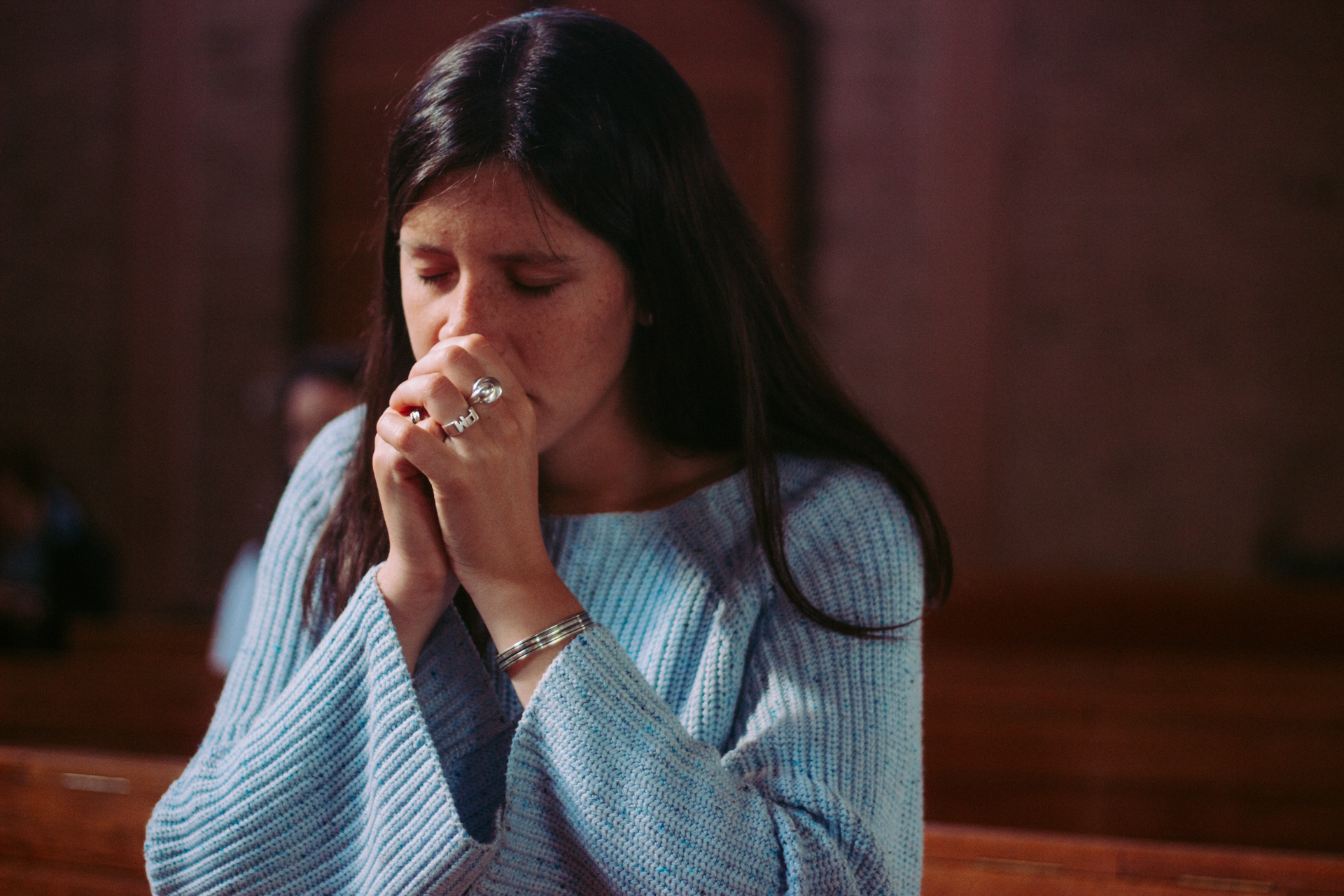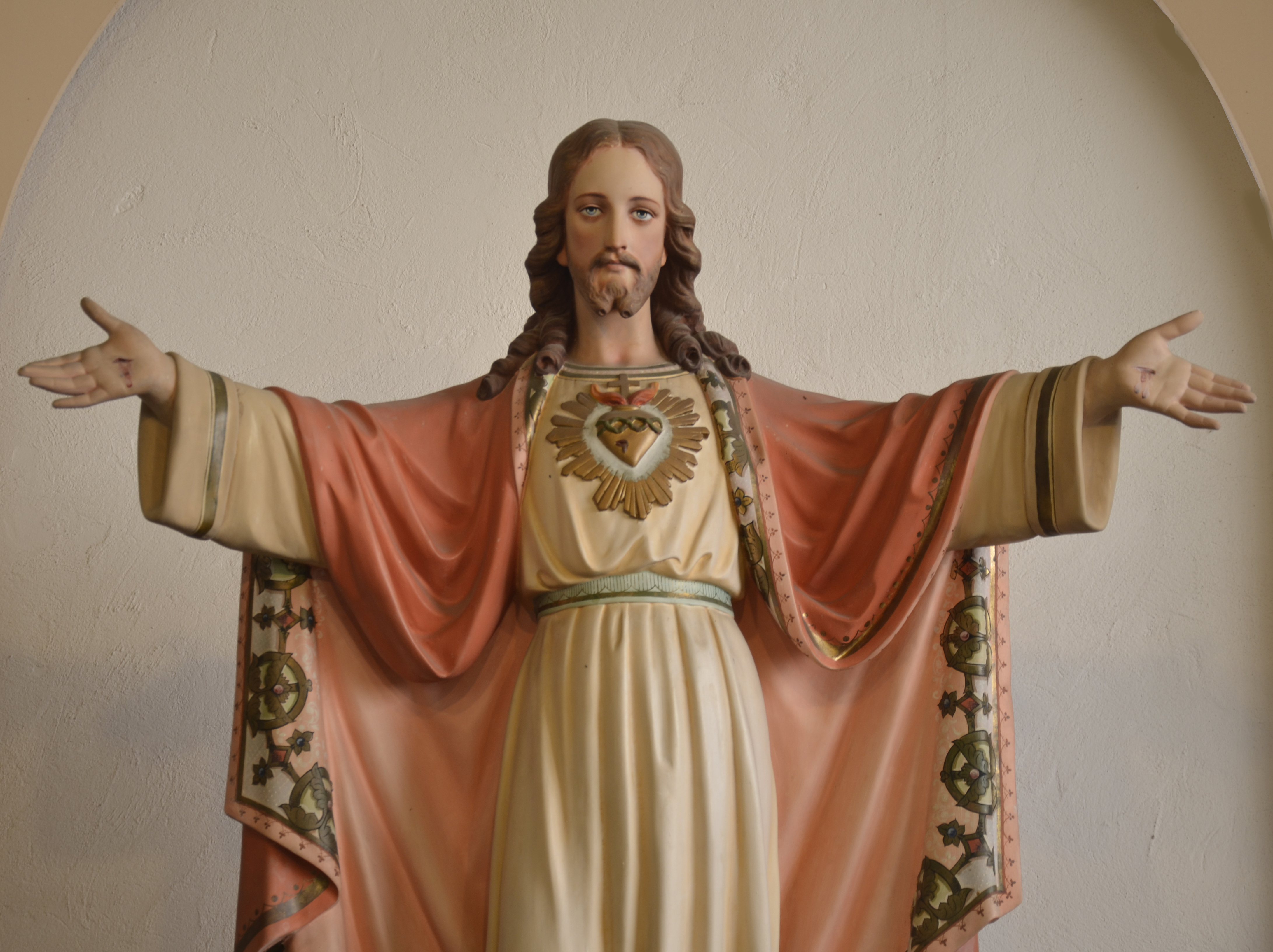Jesus reveals to the Apostles and all of us, “How you are to pray.” (Matt 6:9) He follows with the words which have come to be known as the Our Father, also referred to as the Lord’s Prayer.
This simple yet profound prayer that most of those reading this article can recite by heart. Yet, how often do we pray it? I mean, really, heartfully PRAY it? When we recount the words and the teachings Jesus imparts within the prose, how often do we marvel at the reality that this is not only from Jesus but was the formula for how Jesus himself prayed to God?
How many of us are asking Jesus to teach us how to pray better, grow closer to God, and be more faithful to His teachings? Bottom line, how many of us are asking “how can I be holier?”
I have a confession: I resisted praying the Our Father and even the Hail Mary in my prayer time for many years. I felt they were rote, boring, insincere prayers taught to me as a child, but now as a ‘mature’ adult, I was perfectly capable of fashioning my prayers. I even avoided praying the Rosary because I had convinced myself that memorized prayer had very little value. Unfamiliar at the time with Scripture, I never realized the magnificent origin of this prayer or the actual value it held within.
The commonality of this thought process regarding our childhood prayers was made apparent during my first women’s retreat. After much prayer and consideration, I decided to begin the event with the Rosary. It was on a Saturday, so I created a PowerPoint of the prayers and added vivid, colorful, gorgeous art depicting each of the Joyful mysteries. Everyone got settled in; I welcomed them to the “Seeking the Peace of Forgiveness” retreat, turned down the lights, opened the PowerPoint, and jumped right into the recitation of the Rosary. During the lunch break, one of the attendees pulled me aside and said, “I almost bolted for the door when you began the Rosary. I cannot think of a more boring way to pray. Yet, as the images showed and you offered reflections for each, I am glad I stayed; however, you may want to rethink using that in the future.”
I did rethink it, but I did not remove it. Instead, going forward, after welcoming guests, I spend time explaining why I chose to begin every program by praying the Rosary together—sharing my a-ha moment of discovering the scriptural foundation of the Rosary’s prayers, especially the Lord’s Prayer.
What remarkable benefits accompany time spent with the prayers we know so well that we can repeat them while simultaneously allowing us to ponder the life, death, and resurrection of Jesus? Not only while praying the Rosary but anytime we invoke the words Jesus himself taught us. Challenge yourself to linger at each word, asking the Holy Spirit to bring you ever closer to the Father as you say, “Our Father in heaven,hallowed be your name…”
Jesús revela a los Apóstoles y a todos nosotros, “Ustedes pues, oren así.” (Mateo 6,9) Continúa con las palabras que se conocen como el Padrenuestro, también conocido como la oración del Señor.
Esta oración simple pero profunda que la mayoría de los que leen este artículo pueden recitar de memoria. Sin embargo, ¿con qué frecuencia lo rezamos? Quiero decir, realmente, de todo corazón REZARlo. Cuando contamos las palabras y las enseñanzas que Jesús imparte en prosa, ¿con qué frecuencia nos maravillamos de la realidad de que esto no es solo de Jesús sino que fue la fórmula de cómo Jesús mismo oró a Dios?
¿Cuántos de nosotros le estamos pidiendo a Jesús que nos enseñe cómo orar mejor, acercarnos más a Dios y ser más fieles a sus enseñanzas? En pocas palabras, ¿cuántos de nosotros nos preguntamos “¿cómo puedo ser más santo?”
Tengo una confesión: me resistí a rezar el Padre Nuestro e incluso el Ave María en mi tiempo de oración durante muchos años. Sentí que eran oraciones rutinarias, aburridas y poco sinceras que me enseñaron cuando era niño, pero ahora, como un adulto “maduro”, era perfectamente capaz de moldear mis propias oraciones. Incluso evité rezar el Rosario porque me había convencido de que la oración memorizada tenía muy poco valor. Sin estar familiarizado en ese momento con las Escrituras, nunca me di cuenta del magnífico origen de esta oración o el valor real que contenía.
La similitud de este proceso de pensamiento con respecto a nuestras oraciones de la infancia se hizo evidente durante mi primer retiro de mujeres. Después de mucha oración y consideración, decidí comenzar el evento con el Rosario. Fue un sábado, así que creé un PowerPoint de las oraciones y agregué un arte vívido, colorido y hermoso que representaba cada uno de los Misterios Gozosos. Todos se acomodaron; Les di la bienvenida al retiro llamado “Buscando la Paz del Perdón”, apagué las luces, abrí el PowerPoint y empezamos directamente con la recitación del Rosario. Durante la pausa para el almuerzo, uno de los asistentes me hizo a un lado y dijo: “Casi salgo disparado hacia la puerta cuando comenzaste con el Rosario. No puedo pensar en una forma más aburrida de orar. Sin embargo, como mostraste las imágenes y ofreciste reflexiones para cada una, me alegro de haberme quedado; sin embargo, es posible que desee reconsiderar eso en el futuro”.
Sí lo reconsideré, pero no lo eliminé. En cambio, después de dar la bienvenida a los invitados, pasaba tiempo explicando por qué elegí comenzar cada programa rezando el Rosario juntos, compartiendo mi momento iluminador de descubrir el fundamento bíblico de las oraciones del Rosario, especialmente el Padrenuestro.
¿Qué notables beneficios acompañan el tiempo que dedicamos a las oraciones que conocemos tan bien que podemos repetirlas y, al mismo tiempo, permitirnos reflexionar sobre la vida, la muerte y la resurrección de Jesús? No solo mientras rezamos el Rosario sino cada vez que invocamos las palabras que el mismo Jesús nos enseñó. Desafíate a ti mismo a detenerte en cada palabra, pidiéndole al Espíritu Santo que te acerque cada vez más al Padre mientras dices: “Padre nuestro que estás en los cielos, santificado sea tu nombre…”
 Allison Gingras ( www.ReconciledToYou.com ) — Shares her love of the Catholic Faith with stories, laughter, and honesty as experienced in the ordinary of life! Her writing includes Encountering Signs of Faith (Ave Maria Press) and the Stay Connected Journals for Women (OSV). Allison is a Catholic Digital Media Specialist for Family Rosary, Catholic Mom, and the Fall River Diocese. She hosts A Seeking Heart podcast and is co-host of the Catholic Momcast podcast.
Allison Gingras ( www.ReconciledToYou.com ) — Shares her love of the Catholic Faith with stories, laughter, and honesty as experienced in the ordinary of life! Her writing includes Encountering Signs of Faith (Ave Maria Press) and the Stay Connected Journals for Women (OSV). Allison is a Catholic Digital Media Specialist for Family Rosary, Catholic Mom, and the Fall River Diocese. She hosts A Seeking Heart podcast and is co-host of the Catholic Momcast podcast.Feature Image Credit: Amor Santo, cathopic.com/photo/7752-encounter
The views and opinions expressed in the Inspiration Daily blog are solely those of the original authors and contributors. These views and opinions do not necessarily represent those of Diocesan, the Diocesan staff, or other contributors to this blog.


 Kathryn Mulderink, MA, is married to Robert, Station Manager for Holy Family Radio. Together they have seven children (including Father Rob), and seven grandchildren. She is President of the local community of Secular Discalced Carmelites and has published five books and many articles. Over the last 30 years, she has worked as a teacher, headmistress, catechist, Pastoral Associate, and DRE, and as a writer and voice talent for Catholic Radio. Currently, she serves the Church by writing and speaking, and by collaborating with various parishes and to lead others to encounter Christ and engage their faith. Her website is
Kathryn Mulderink, MA, is married to Robert, Station Manager for Holy Family Radio. Together they have seven children (including Father Rob), and seven grandchildren. She is President of the local community of Secular Discalced Carmelites and has published five books and many articles. Over the last 30 years, she has worked as a teacher, headmistress, catechist, Pastoral Associate, and DRE, and as a writer and voice talent for Catholic Radio. Currently, she serves the Church by writing and speaking, and by collaborating with various parishes and to lead others to encounter Christ and engage their faith. Her website is 
 Kate Taliaferro is an Air Force wife and mother. She is blessed to be able to homeschool, bake bread and fold endless piles of laundry. When not planning a school day, writing a blog post or cooking pasta, Kate can be found curled up with a book or working with some kind of fiber craft. Kate blogs at
Kate Taliaferro is an Air Force wife and mother. She is blessed to be able to homeschool, bake bread and fold endless piles of laundry. When not planning a school day, writing a blog post or cooking pasta, Kate can be found curled up with a book or working with some kind of fiber craft. Kate blogs at 
 A lover of Jesus Christ, a wife, and a mother of five, Christine is the author of Everyday Heroism: 28 Daily Reflections on the Little Way of Motherhood. She is a graduate of Franciscan University, an instructor for the Institute for Excellence in Writing, and an experienced catechist. Thrilled to have recently become grandparents, she and her husband currently live in Upstate, NY. Visit her author webpage at
A lover of Jesus Christ, a wife, and a mother of five, Christine is the author of Everyday Heroism: 28 Daily Reflections on the Little Way of Motherhood. She is a graduate of Franciscan University, an instructor for the Institute for Excellence in Writing, and an experienced catechist. Thrilled to have recently become grandparents, she and her husband currently live in Upstate, NY. Visit her author webpage at 
 Dr. Alexis Dallara-Marsh is a board-certified neurologist who practices in Bergen County, NJ. She is a wife to her best friend, Akeem, and a mother of two little ones on Earth and two others in heaven above.
Dr. Alexis Dallara-Marsh is a board-certified neurologist who practices in Bergen County, NJ. She is a wife to her best friend, Akeem, and a mother of two little ones on Earth and two others in heaven above.
 Mike Karpus is a regular guy. He grew up in Michigan’s Upper Peninsula, graduated from Michigan State University and works as an editor. He is married to a Catholic school principal, raised two daughters who became Catholic school teachers at points in their careers, and now relishes his two grandchildren, including the older one who is fascinated with learning about his faith. He also has served on a Catholic school board, a pastoral council and a parish stewardship committee. He currently is a lector at Mass, a Knight of Columbus, Adult Faith Formation Committee member and a board member of the local Habitat for Humanity organization. But mostly he’s a regular guy.
Mike Karpus is a regular guy. He grew up in Michigan’s Upper Peninsula, graduated from Michigan State University and works as an editor. He is married to a Catholic school principal, raised two daughters who became Catholic school teachers at points in their careers, and now relishes his two grandchildren, including the older one who is fascinated with learning about his faith. He also has served on a Catholic school board, a pastoral council and a parish stewardship committee. He currently is a lector at Mass, a Knight of Columbus, Adult Faith Formation Committee member and a board member of the local Habitat for Humanity organization. But mostly he’s a regular guy.
 Emily Jaminet is a Catholic author, speaker, radio personality, wife, and mother of seven children. She earned a bachelor’s degree in mental health and human services from the Franciscan University of Steubenville. She is the co-founder of
Emily Jaminet is a Catholic author, speaker, radio personality, wife, and mother of seven children. She earned a bachelor’s degree in mental health and human services from the Franciscan University of Steubenville. She is the co-founder of 


 J.M. Pallas has had a lifelong love of Scriptures. When she is not busy with her vocation as a wife and mother to her “1 Samuel 1” son, or her vocation as a public health educator, you may find her at her parish women’s bible study, affectionately known as “The Bible Chicks.”
J.M. Pallas has had a lifelong love of Scriptures. When she is not busy with her vocation as a wife and mother to her “1 Samuel 1” son, or her vocation as a public health educator, you may find her at her parish women’s bible study, affectionately known as “The Bible Chicks.”
 Dakota lives in Denver, CO with her husband, Ralph, and their two sons, Alfie & Theophilus. She is the Dean of Enrollment Management for Bishop Machebeuf High School where her husband also teaches. You can find Dakota at the zoo or a brewery with her family or with her nose in a book at home. For more of Dakota’s writing check out
Dakota lives in Denver, CO with her husband, Ralph, and their two sons, Alfie & Theophilus. She is the Dean of Enrollment Management for Bishop Machebeuf High School where her husband also teaches. You can find Dakota at the zoo or a brewery with her family or with her nose in a book at home. For more of Dakota’s writing check out 
 Elizabeth Tomlin is the author of Joyful Momentum: Building and Sustaining Vibrant Women’s Groups and contributing author to the Ave Prayer Book for Catholic Mothers. She is General Counsel for the Archdiocese for the Military Services, USA. Elizabeth is an Army wife and mother of three and currently lives in the DC area. She blogs at
Elizabeth Tomlin is the author of Joyful Momentum: Building and Sustaining Vibrant Women’s Groups and contributing author to the Ave Prayer Book for Catholic Mothers. She is General Counsel for the Archdiocese for the Military Services, USA. Elizabeth is an Army wife and mother of three and currently lives in the DC area. She blogs at 
